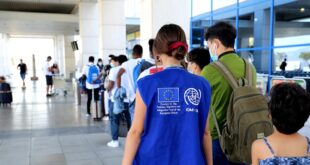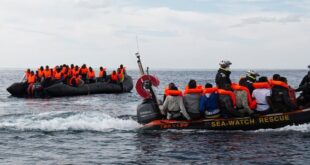A new Italian security and immigration law known as the ‘Salvini Decree’, which was passed by the Chamber of Deputies last week, has entered into force. Far-right politician Matteo Salvini has made reducing the number of migrants and refugees in Italy one of his key goals as interior minister.
Here’s what you need to know about the decree.
Tighter restrictions for permits – There will no longer be any stay permits granted for humanitarian reasons but there will be temporary ‘special permits’ granted for 6 reasons: serious health issues, calamities in countries of origin, acts of civic valour, trafficking victims, domestic violence victims and severe exploitation victims.
More time in repatriation centers – The maximum amount of time that foreigners can held in repatriation centers (CPR) will increase from 90 days to 180 days. If capacity is reached in the CPR, the decree will permit the holding of migrants waiting to be expelled in other state police facilities, and asylum-seekers in hotspots.
Revocation of asylum can be justified by more crimes, including theft – The list of crimes that justify the rejection or revocation of international protection has been expanded to include: rape, serious physical harm, robbery, violence against a public official, genital mutilation, aggravated theft and drug trafficking. The Senate added the crime of home burglary, even if not aggravated.
Citizenship revocation – Citizenship will be revoked for those found guilty of terrorism.
Asylum procedure halted after commission decision – If an asylum-seeker is subjected to criminal proceedings or convicted for one of the above offences, the Territorial Commission must hear the asylum-seeker and make a decision on the case. If the asylum application is rejected, the asylum-seeker will be obliged to leave the country, even if the appeal against the decision is pending.
SPRAR system – Only those granted international protection and unaccompanied minors can access the SPRAR system. Those already in the system will remain so until the project ends.
Waiting period for citizenship application – The assessment procedure for citizenship requests will now take up to 4 years instead of 2, and those applying will need to know Italian.
List of safe countries of origin – Accelerated examination of protection requests for asylum-seekers from the countries on the list.
Urban DASPO – DASPOs, which are orders to stay away from specific places, will be extended for sports events for those suspected of terrorism. Urban DASPOs can be applied for healthcare facilities and in areas used for markets, fairs and public performances.
Eviction crackdown – Tougher sanctions will be brought in for those supporting the occupation of buildings (from 2 to 4 years) and there will be an extension of the use of wiretaps against them.
Bothersome begging – Begging that is so insistent as to be bothersome will become a crime with a maximum sentence of 6 months or 3 years if children are used.
Mayor to decide on ‘ethnic shops’ – Mayors will be able to decide on limits to opening hours for shops for up to 30 days for those affected by ”nocturnal aggregation,” even in areas not near urban centers.
© ANSA
 THE AFRICAN COURIER. Reporting Africa and its Diaspora! The African Courier is an international magazine published in Germany to report on Africa and the Diaspora African experience. The first issue of the bimonthly magazine appeared on the newsstands on 15 February 1998. The African Courier is a communication forum for European-African political, economic and cultural exchanges, and a voice for Africa in Europe.
THE AFRICAN COURIER. Reporting Africa and its Diaspora! The African Courier is an international magazine published in Germany to report on Africa and the Diaspora African experience. The first issue of the bimonthly magazine appeared on the newsstands on 15 February 1998. The African Courier is a communication forum for European-African political, economic and cultural exchanges, and a voice for Africa in Europe.

























